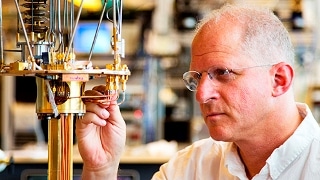The University of Copenhagen plays a vital role in an aspiring ambitious Microsoft multi-million dollar investment. On 6th September 2017, the tech company and the University signed a long-term collaboration agreement on the development of a general-purpose, scalable quantum computer. This project makes room for new opportunities in science and technology.
 The Niels Bohr Institute’s Centre for Quantum Devices (Qdev), headed by Professor Charles Marcus, will be pivotal in the collaboration between Microsoft and the University of Copenhagen.
The Niels Bohr Institute’s Centre for Quantum Devices (Qdev), headed by Professor Charles Marcus, will be pivotal in the collaboration between Microsoft and the University of Copenhagen.
Microsoft is increasing its investment at the Niels Bohr Institute by virtue of a new collaboration agreement with the University of Copenhagen. Microsoft employees will be working diligently with the Institute’s Researchers in order to develop and build the very first general-purpose, scalable quantum computer in the whole world.
The Microsoft employees are responsible for turning knowledge gained from research into noticeable reality. The announcement of this extended partnership, which includes the expansion of facilities at the University’s North Campus, will additionally establish Niels Bohr's Copenhagen as a global epicentre for quantum mechanics in perfect association with the vision of Greater Copenhagen as a global hub for innovation and science.
The University of Copenhagen’s quantum research contributes to placing Danish research at the very top, which was evidenced today by the IT giant, Microsoft, expanding its investment in a Quantum development center in Denmark. It’s a perfect example of how a university can create value in collaboration with the business sector from all over the world.
Søren Pind, Danish Minister for Higher Education and Science
Basic research and business meet
Thomas Bjørnholm, Prorector for Research and Innovation at the University of Copenhagen, considers this multi-year agreement with Microsoft as the culmination of a constant and extremely focused research partnership within quantum technology.
When a company such as Microsoft chooses to situate and invest heavily into a research development center at the University of Copenhagen, it’s because we’ve had a significant focus on building up one of the world's leading quantum research environments. We’re very proud of this and are confident that it will reinforce a strengthened perception of Denmark as an attractive destination for international investments.
Thomas Bjørnholm, Prorector for Research and Innovation, the University of Copenhagen
One of four centers
Together with the activities and effort across Qdev and Microsoft, the other quantum research centers at the University of Copenhagen, including the Center for Quantum Optics (Quantop), the Center for Quantum Photonics, the Villum Center for the Mathematics of Quantum Theory (Qmath) and the Quantum Innovation Centre (QuBiz), will enhance the open Quantum research that the University will generate, in order to further propel the University into the global Quantum spotlight.
Besides establishing ‘Station Q Copenhagen’ through this new chapter of Microsoft and the University’s partnership, Microsoft has also developed partnerships with Universities in the Netherlands, Australia and the United States. Station Q Copenhagen is considered to be only one of four prominent experimental Station Q sites in whole world, together with Purdue University, Delft University of Technology and the University of Sydney.
Computers based on quantum technology are capable of solving and executing complex mathematical calculations at a much faster rate than any prevailing computer built with ordinary bits. Bits based on quantum particles, called qubits, will — when stabilized and incorporated into a computer — produce unprecedented performance. This indeed will translate into the potential to develop major opportunities and tackle demanding challenges like IT security and encryption, material and drug design, global warming and more.
Main points of the collaboration agreement
- Microsoft is currently establishing advanced Microsoft research and development laboratories at the University of Copenhagen North campus in close proximity to the Niels Bohr Institute.
- More than a dozen Microsoft employees ranging from Engineers to Developers are presently situated at the University of Copenhagen. Over the course of the new long-term agreement, the size of this team will eventually grow, in association with University personnel in the development of a topological quantum computer.
- Besides the multi-million dollar investment in modern equipment and facilities, Microsoft is also committing to major quantum research funding at the University of Copenhagen.
- The partnership between the University of Copenhagen and Microsoft will be based at the Centre for Quantum Devices (Qdev) and helmed by Professor Charles Marcus. Charles Marcus is Microsoft’s Scientific Director of Station Q Copenhagen.
- An agreement focusing on the elements of the collaboration has been signed including the license rights to Microsoft and the University of Copenhagen. The agreement highlights the interests of the parties and considers applicable guidelines and legislation in this area.
The partnership between the University of Copenhagen and Microsoft is considered to be a breakthrough example of the science and research made capable by taking into account private and public interests. Together, through this latest phase of the partnership, the team is composed to make serious strides in topological quantum computing in continuance of the quantum economy –globally and locally.
Source:
Microsoft establishes Quantum Centre at the University of Copenhagen- http://news.ku.dk/all_news/2017/09/microsoft-establishes-quantum-centre-at-the-university-of-copenhagen/